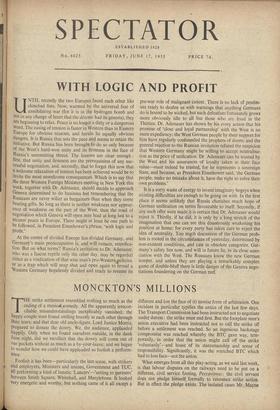WITH LOGIC AND PROFIT
UNTIL recently the two Europes faced each other like clenched fists. Now, warmed by the universal fear of annihilating war (for it is in the hydrogen bomb and not in any change of heart that the detente had its genesis), they are beginning to relax. Peace is no longer a dirty or a dangerous word. The easing of tension is faster in Western than in Eastern Europe for obvious reasons, and herein lie equally obvious dangers. It is Russia that sets the pace and seems to retain the Initiative. But Russia has been brought to do so only because of the West's hard-won unity and its firmness in the face of Russia's unremitting threat. The lessons are clear enough first, that unity and firmness are the prerequisites of any suc- cessful negotiation, and, secondly, that to forget this now that a welcome relaxation of tension has been achieved would be to Invite the most unwelcome consequences. Which is to say that the three Western Foreign Ministers meeting in New York this week, together with Dr. Adenauer, should decide to approach Geneva determined to do business but remembering that the Russians are never wilier as bargainers than when they come bearing gifts. So long as there is neither weakness nor appear- ance of weakness on the part of the West, then the road of negotiation which Geneva will open may lead at long, last to a securer peace in Europe. There might at least be one path to be followed, in President Eisenhower's phrase, 'with logic and profit.'
At the centre of divided Europe lies divided Germany, and Germany's main preoccupation is, and will remain, reunifica- tion. But on what terms? Russia's invitation to Dr. Adenauer. who was a fascist reptile only the other day. may be regarded either as a vindication of that wise man's pro-Westernfolicies. or as a trap which will snap shut and open again to reveal a Western Germany hopelessly divided and ready to resume its pre-war role of malignant cancer. There is no lack of pessim- ists ready to deafen us with warnings that anything Germans do is bound to be wicked, but such defeatism fortunately grows more obviously idle to all but those who are fixed in the Thirties. Dr. Adenauer has shown by his every action that his promise of 'close and loyal partnership' with the West is no mere expediency; the West German people by their support for him have regularly confounded the prophets of doom; and the general reaction to the Russian invitation refuted the suspicion that Western Germany might be willing to accept neutralisa- tion as the price of unification. Dr. Adenauer can be trusted by the West and his assurances of loyalty taken at their face value—must indeed be trusted, for he represents a sovereign State, and because, as President Eisenhower said, 'the German people, make no mistake about it, have the right to solve their own problems.'
It is a sorry waste of energy to invent imaginary bogeys when existing difficulties are enough to be going on with. In the first place it seems unlikely that Russia cherishes much hope of German unification on terms favourable to itself. Secondly, if any such offer were made it is certain that Dr. Adenauer would reject it. Thirdly, if he did, it is only by along stretch of the imagination that one can see this disastrously weakening his position at home; for every party has taken care to reject -the idea of neutrality. Too much discusSion of the German prob- lem is rooted in the circumstances of yesterday, determined by non-existent conditions, and cast in obsolete categories. Ger- many's safety lies now, and will in future lie, in its close asso- ciation with the West. The Russians know the new German temper. and unless they are playing a remarkably complex game of double-bluff there is little danger of the Geneva nego- tiations foundering on the German reef.


































 Previous page
Previous page